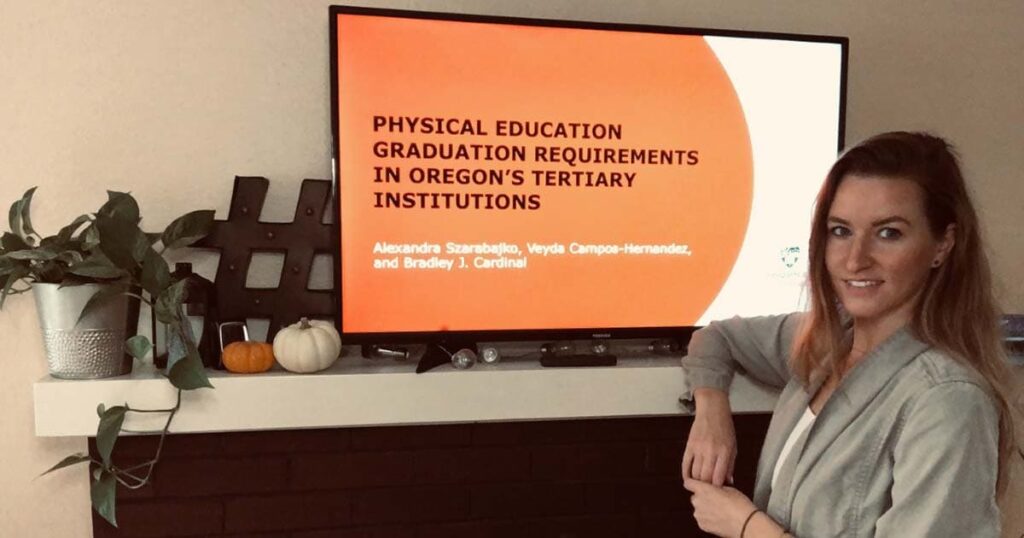
Opportunities are out there – but are meaningful only if you seize them. Applying skills and knowledge learned in college can welcome great rewards, but some students find it hard to gain necessary experience and make professional connections in their fields on top of busy class schedules, homework and extracurricular activities.
Veyda J. Hernandez, ’21, is one such student who felt they needed guidance in their field. They joined the College of Public Health and Human Sciences’ (CPHHS) CATALYST mentorship program as a mentee, where they matched with PhD student and mentor Alexandra (Alex) Szarabajko.
The CATALYST mentorship program pairs professionals and leaders from various fields with CPHHS students with similar career interests. Students enrolled in the course receive three credits as a part of the college’s REAL program, which offers students real-life experience ahead of graduation.
“What inspired me to join the CATALYST program as a mentor is my passion for supporting students in exploring their passions and achieving their academic and professional goals,” Alex says. “When I was an undergraduate student at another university, no comparable mentorship program existed. I had to find mentors or shadow people from different professions on my own.”
Due to COVID-19, Veyda and Alex could not meet in person, but their virtual meetings were productive. The duo decided to collaborate on a research project and hoped to present their findings at a conference so that Veyda could gain valuable research experience.
The idea for their research project stemmed from Alex’s dissertation focus on the current physical education requirement (PER) status in U.S. tertiary institutions. To pilot test her dissertation idea, Alex and Veyda conducted a study that addressed PERs in Oregon’s tertiary institutions.
“I’ve been an athlete for most of my life, and I’ve always been passionate about physical activity because it was something that helped me a lot growing up,” Veyda says. “For our research project, we wanted to see how many colleges and universities still required PE and other health classes to graduate compared to 10 years ago. By making these classes a requirement, more people learn about physical health and activity, and are more likely to implement it in their daily lives in the future.”
A majority of colleges and universities in the United States developed PERs throughout the 20th century. However, in the early 21st century, such requirements dropped to an all-time low of 39%. Their research found that only five in 35 higher education institutions in Oregon require physical activity courses, including Oregon State.
“The data we found in Oregon is sparse, but not an entirely surprising outcome given the national downward trend that has been observed in the past,” Alex says.
Working with CPHHS Professor and Alex’s PhD advisor, Brad Cardinal, Veyda and Alex developed a manuscript of their findings, which was recently published in the Journal of Kinesiology and Wellness.
Additionally, the two presented a research poster from this project in early October at the 66th Annual Conference of the Western Society of Kinesiology and Wellness. Their poster was awarded the Lawrence Bruya Original Research Poster Award.
“It all started with the idea to complete a research study, and we ended up accomplishing more than we ever anticipated. I am very proud of Veyda and the work we have completed as a team,” Alex says.
“My favorite part was getting to be part of something bigger than myself, by making a difference in the world and sharing my passion for promoting physical wellness and activity,” Veyda says. “I’m excited to bring up this research in the future when we really have to fight to keep PE and health classes in schools.”
Veyda graduated with a bachelor’s degree in kinesiology in spring 2021 and now works as a resilience coordinator for AmeriCorps. Alexandra has started her fourth and final year as a PhD kinesiology student in the CPHHS and is thankful for her own mentorship from Brad.
“I’m so proud of them both and thankful to the college for its innovative CATALYST program,” he says.
“I would encourage every CPHHS student to consider enrolling in the CATALYST program,” Alex says. “Students get to network and learn from professionals related to their interests, work on great projects and accomplish goals that enrich their vitae. It is truly an amazing experience.”